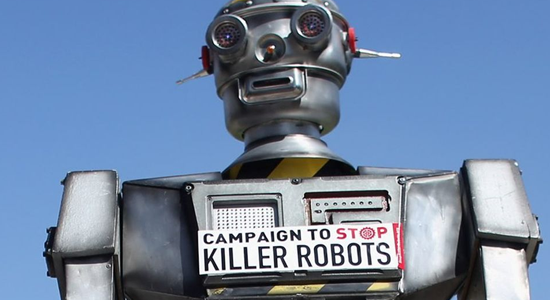A Twitter user in Japan has been banned from using the social networking site for making a death threat against a mosquito. Tweeting abuse would sometimes get you banned from the platform but Twitter's decision to ban user @nemuismywife has attracted ridicule on social media.
Nigerian Scientist Creates An Explosive-Detecting Computer Out Of Organic And Synthetic Processors, The First Of Its Kind In The World
A Nigerian neuroscientist, Oshiorenoya Agabi has revealed a computer replicating computational power neurons in our brain by including neurons in a silicon chip and make a new form of biological processor is now a possibility. The San Francisco based start-up Koniku, claims to be the world’s first nuerocomputation company has invented an artificial intelligence that can literally sniff out bombs in the vicinity.
Experts Call For UN Intervention On Killer Robots
More than 100 leading robotics experts are urging the United Nations to take action in order to prevent the development of "killer robots". In a letter to the organization, artificial intelligence (AI) leaders, including billionaire Elon Musk, warned of "the third revolution in warfare".
Facebook launches New Video Service
Social media giant Facebook has made introduce a new video feature called Watch, which lets users discover videos from outside their feed more easily and will also dabble in original content. The new offering comes after months of speculation about the service and on facebook’s plans to revamp its video offering, putting it against YouTube and Netflix. Facebook has about 2 billion monthly users.
Nigeria Ranks 3rd In Cybercrimes Globally Behind UK, U.S. – NCC
The Nigerian Communications Commission, NCC, says Nigeria currently ranks third globally in cybercrimes behind the UK and the U.S. NCC’s Chief Executive Officer, Umar Danbatta, disclosed this on Tuesday at the ongoing 2017 Annual General Conference of the Nigerian Bar Association, NBA, in Lagos. The News Agency of Nigeria, NAN, reports that the conference’ theme is: “African Business: Penetrating through Institution Building”.
Researchers Hack Computer Using DNA
Researchers from the Paul G Allen school of computer science and engineering at the University of Washington, say they have successfully hacked into a computer using custom strands of DNA for the first time.
Cyber Threats Prompt Return Of Radio For Ship Navigation
The risk of cyber attacks targeting ships' satellite navigation is pushing nations to delve back through history and develop back-up systems with roots in World War Two radio technology.


























)